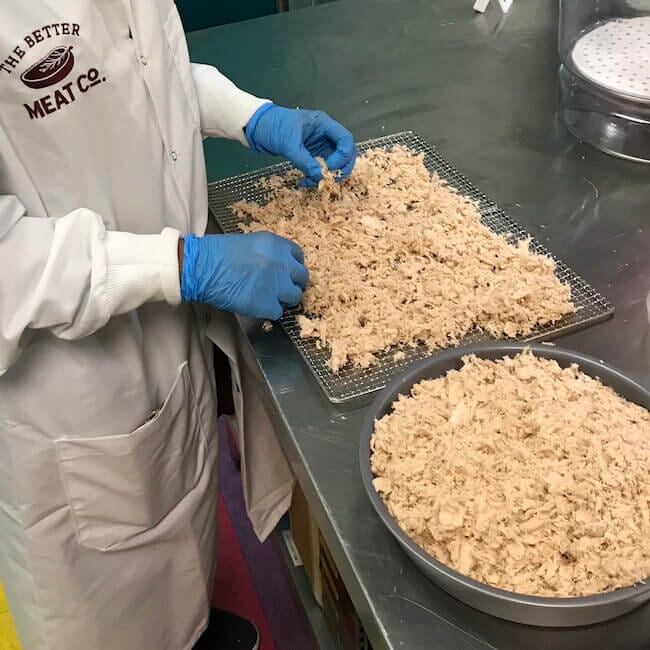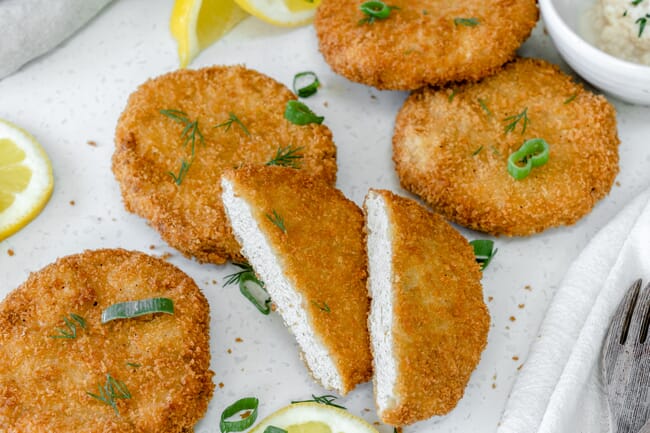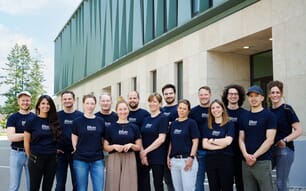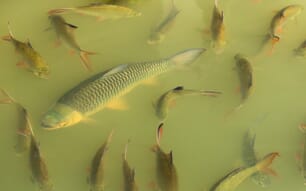What is mycoprotein and how does protein fermentation work?
Most people think about protein coming from either animals or from plants. And those are two great kingdoms, but there's an entirely different kingdom called fungi. And that kingdom is not in the middle of plants or animals – in fact, it's much closer to animals than to plants.

What we're doing is utilising a specific type of fungi fermentation that grows mycelium. Mycelium is not mushroom, but it is the root structure of fungi. It’s a high protein, high fibre material that’s called mycoprotein. And our mycoprotein is a real superfood: it's high in protein, fibre and iron. It has a very meaty texture so it requires less processing that plant protein isolates. We run a fermentation on the mycoprotein and then de-water it, and from there, we can use the product for plant-based fish, plant-based meat and so on.
The mycoprotein that we produce is called Rhiza, and it has a very neutral flavour. The next step is flavouring it and getting the right moisture balance and texture to imitate salmon, tuna or pollock.
What production challenges did you have to overcome when you began producing Rhiza? Or was identifying the right fermentation candidate the big challenge?
The challenges are endless. We had to run literally thousands of experiments before we could begin optimising production. Rhiza is a particular type of mycoprotein, but when you're doing this, you don't have the advantage of much background knowledge. If you think about chickens, they have been selectively bred for centuries. Researchers could access vast amounts of public funding for studies to figure out what to feed them, their housing requirements and what the stocking density ought to be. That's billions of dollars of federal research money that has gone into helping that industry optimise their process.
The Better Meat Company didn’t have that advantage. We're dealing with wild strains of mycoprotein that are extremely nutritious, but that have not really been domesticated. Fermentation brings about its own challenges as well, from finding the right pH, the right flow rate, the right species, the right design of your fermenter – and that's just scratching the surface.

What makes mycoprotein competitive as a sustainable plant-based meat alternative?
First and foremost, we're using a tiny little fraction of the land that is needed to produce animals for food. We're doing indoor, controlled-environment agriculture. We take a very natural process, wrap it in stainless steel, and allow it to occur faster than it would normally happen. So, we can go from inoculating our fermenter (which means putting the starter cultures in the tank) to harvesting in less than one day. To compare, it takes more than a year to raise a cow to slaughter weight. Fish farming can take months, and producers have to feed them other fish as well – so there are some sustainability concerns there.
What we're doing doesn't use any animal protein and it is done in less than a day. We can create a river of Rhiza coming out of our plant that has a higher iron content than meat, a higher protein content than eggs, is a good source of fibre and has a great meaty texture. It’s a super food in terms of its functionality and nutrition. The sustainability comes from how much we can produce with such a small footprint.
Many plant-based seafood products seem to be targeting wealthy and Western consumers – do you think that consumers in the Global South will be able to rely on fermented plant-based seafood as a stable source of nutrition?
Yeah, maybe even more so. A lot of people don't live near any local waterway that would provide them with seafood, and so they're relying on people or fish markets where they're shipping the fish long distances. We can produce Rhiza in a fermentation facility that we can build anywhere. Consumers in the Global South can be divorced from the traditional fish supply chain. That way, people who are living in areas that don't have a lot of fish nearby could enjoy Rhiza.

It seems like a lot of the plant-based meat space is dominated by large corporates and agri-food companies – do you think that plant-based seafoods will provide a livelihood for individuals the way that aquaculture does?
I think that the plant-based space will operate like the rest of the food industry: bigger companies will swallow smaller companies. But, if you look at success stories like Beyond Meat and the Very Good Food Co, they were founded by individuals with great products. There are companies that succeeded without being acquired by the Nestlé’s and Unilever’s of the world.
Beyond Meat was started by one person who just wanted to make a difference, and over the course of a decade built it into a multi-billion-dollar company. The Very Good Food Co was started a few years ago by a couple of guys selling at a farmer's market in Canada. They were selling products they made in their kitchen, and last year they had an initial public offering (IPO) and they’re thriving.
I think that the alternative protein sector is trying to solve a problem – and that problem is that you cannot possibly feed billions more people on the planet in the way that we currently feed ourselves with protein. There are almost eight billion of us today, there's probably going to be ten billion of us within the next 30 years. We're not going to get more fish, we're not going to get more land. We're going to have to produce a lot more food with fewer resources.
The big food companies have been specialists at improving efficiency to produce more with less. They're going to play an important role in helping to provide cost-effective affordable food for not only the Global South, but the rest of world as well.
I agree with the premise that there's a lot of consolidation and concentration, but it's not omnipresent. In some ways it might be important for the world to have the big food companies taking these smaller companies and scaling them so that these sustainable proteins solutions can actually reach millions of people as opposed to just being niche markets.
Some people have a natural tendency to say, "big is bad.” Now, sometimes it can be bad if a big company is doing a bad thing. But, if a large company is trying to scale a sustainable protein option that could only be sold at a farmer’s market and make it available in thousands of supermarkets, that’s pretty good.
How do you see the fermented market, especially for seafood, evolving in the coming years?
Well, right now there's really only one company in the space, Quorn. I'm a big admirer of the company, and they've had the mycoprotein market to themselves for 30 years. I think that there's going to be a lot of other companies entering the space and creating healthy competition. This will lead to really interesting product development and creation of new goods that will use a tiny fraction of the resources needed to produce seafood and other types of animal proteins today. It won't be just mycoprotein, there'll be other styles of fermentation that are being utilised.
People are accustomed to fermentation by saying, "Hey, how do we take these grains and make alcohol with them?" Or, "How do we take these grains that make bread rise with them?" But fermentation is going to be used for a lot more than bread, alcohol and cheese in the future. It's going to be used for creating all types of proteins that can be more functional than the conventional plant proteins that are currently available. Currently, plant-based meat is made out of pea, wheat, or soy, or some combination thereof. Fermentation will allow a whole variety of new options that won't be just pea wheat or soy that makers of alt-protein can utilise.
Other than more players entering the space, how do you see the broader alternative seafood industry evolving in the coming years?
Plant-based meat is still less than 1 percent of all meat that is sold. Plant-based seafood is probably less than a tenth of a percent. It is a tiny little fraction, but it's growing, and it's increasing in popularity and there's a lot of money going into the space. I think that just in the same way that we saw with milk. Looking at the milk category 15 years ago, plant-based milk was a tiny little fraction of the milk market. Now it's close to 15 percent of the fluid milk that is sold is other, oat milk, soy milk, rice milk, coconut milk or some other type of alt-milk.
I think you're going to see something similar in the fish space as well. People are going to want this – and not just because of overfishing concerns. They're going to perceive it as having a health benefit, or maybe they're going to perceive a mercury advantage or a micro-plastics advantage with alt-seafood. I think that you're going to see alt-protein become not-so-alt in the same way that alt-milk became not-so-alt.

Do you think the products that the Better Meat Company is developing are going to replace traditional sources of seafood? Do you see any pros and cons for this?
I don't think it would completely replace seafood – we're 130 years after the car and we still have horse-drawn carriages. So, I don't foresee a total replacement, but I do think that these types of animal-free proteins will reduce our reliance on animals. We won't have to take as many fish from the sea, we won't have to raise as many chickens and pigs. I really think that this will be viewed as a complement to our protein strategy.
If you think about the word protein in the past, many people just thought it was synonymous with a hunk of flesh from a once-living animal's body. In the future though, people are going to have a far more diverse view of protein.
They're going to think about protein, yes from animals, but also from plants, from cell-culture and also from microbial fermentation. I think there'll be hybridised proteins where you could envision a crab cake that might be, let's say, part actual crab meat and part mycoprotein, or maybe part cell-cultured. There's going to be a far more interesting and diverse portfolio of proteins in the future.
And yes – that will mean that we will be using fewer animals for food.








